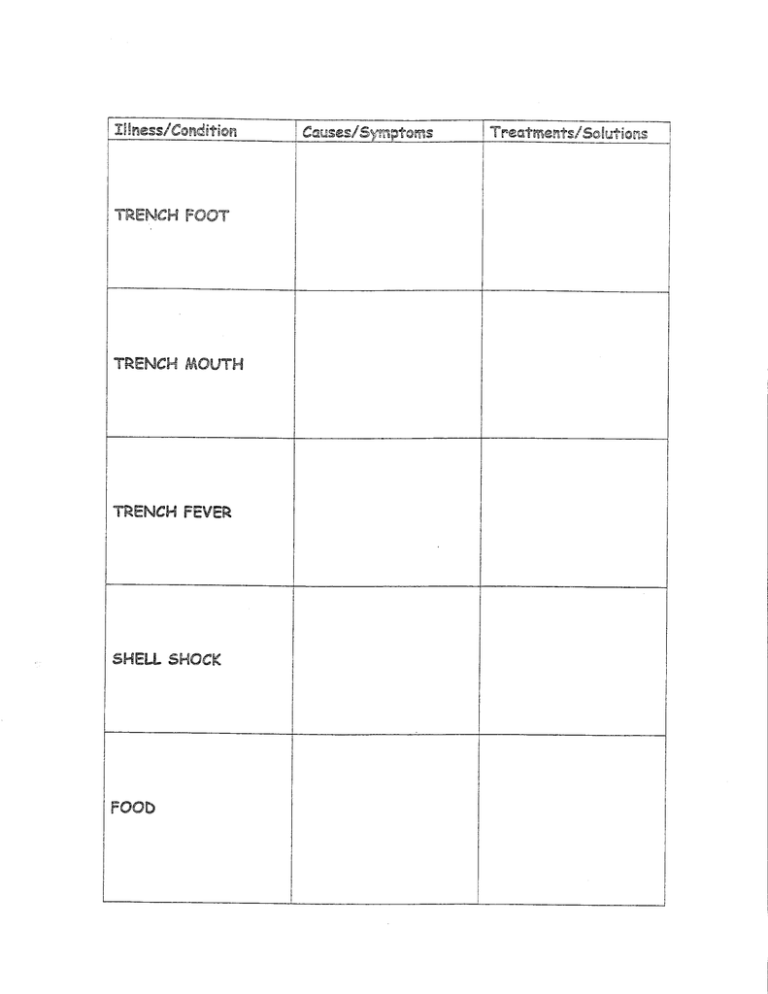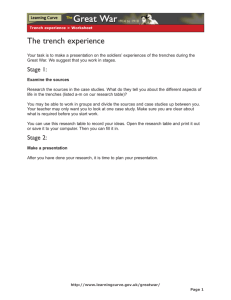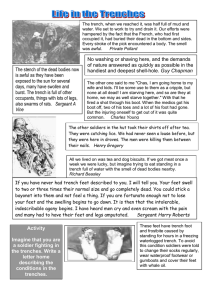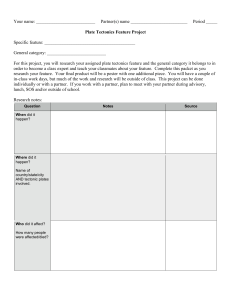sHEtL SEEmessl€emdff,dec? €euscs/ TREN€H
advertisement

SEEmessl€emdff,dec? i €euscs/
TREN€H ffiGUTH
TREruEH FEVER
sHEtL SHS€K
TrcafmemrslSocuf6ons
Treneh Werf'*re end fe ndltisy:s
T'nene hes
hlo
e\4csr's
Land
Fslaehine 6uns
Condifions in the
,'
r rencn
.5hell shocked"
S'frefened ever 3GO n'riles
Barbed wire, guns, erfillery cnd eenpse**
Fronf ilnc scldiens lived in dugouts of .rh!eE<
Sfctioned fcr weeks cn end
Mc!n work vscs diqqinc. rernovinro wcten
Deodly arec befween en€my frencl'les
Rsfs, eorpses
Soldrers ercssad intCI enemy ferrifory
ehcnged fiEhtinE
Took 4-6 menr fo use
400 rounds/mri nute. fine pCIwer of 300 guers
Trench foot
Infested wl'ih n"efs, lice, fle*r:,s, gcrrns
Hggry, diseose, no sleep
fvlanfolly wounded
Flard f,o return home
Crcss-s eftio{-r
of trenc}a
P=ranaf'
I
|Jr
imud
'Dnr!-^-{
gUt
sHvrt
VVV
a a'-!'l-r ! n n n-l l^, ^ ^ UUgSvI
-At||l/\-llltll-ll\I
Nc-nian's
iz.gh,rfi
l^-,A
l-lll{
)
oh^ilF.^l^\l
I-ttt
ti ttF\
J
4\
tj -V
\\
*.1
lllr.*ir\
tn
-\
rrvs\vlJ an
IFrraef
nt
_av
t
-\-L_h.
=:_E:
r*
E
z}--l+:+jH/t
T
Iftrne
| | vt
lvt hcq
tuu
r<--.----->;n
I
u.-'= jl,=ilEis
-^i.^-
Tbe first thing was it smelled bad. trt sraelled bad because there were open latines everywhere.
There were bcdies rotting everywhere. Nothing could be done about them. You could
tJ:row a
shovel full of quick lime on thern to teke sone of the smell away, but the odor ofthe trenches
was
appalling. trt's hard to imagine people living for years in the nniddie of tirat smeil. That's what they
had to endure. Therq of @urse, no buntrcs, no ptraces to lie doqrn when you weren't on dury;
ytu
lay in the mud, in a hole ctrt ia the side of the trenc[ or in a dugout if
were an ofrcer or an
NCO.
*
i*
As all miiitary people know, the best ti-e for attacking is in the eariy morning; pafily becairse you
have the advantage of darkness in foroing the troops up, and you also have the advantage of a
fullday in whicb you can prosecute the deveiopment of the attack before it gets dark again. Both
sides, both the Crennan and tbe British, had rnoru.ing stand-to, which is short for stand-to-arms.
And, in the darkness as dswn was just about to open up, they wouid each stand on their fuing
steps in the trenches, which puts you about this high above the trenc[ and it was stitrl dark. you
stood therewitb your loaded rifle waiting for ar aruck Aom the Cverma$. And, the Geroans d.id
the same thing. And, when it was fully iight, about a balf-hour after stand-to, it was ciear that no
attack was goana bapp* th:t 66raisg. So, you stood down and h"d brea.kfast, usualiy eating it
on the firing trencb, which was like a building bench in the trench you were occupying. There's
nothing to do sLl day, except listen to 15" lgngs as tbe shells wEat oft'aie6arhere. fuid- the objec
of each side was to txy to put Elortsr shells into the enem3r frinch and destroy it or blow it up,
bll the pcople in it. So, tbse's constslc noise and bmbardmect ail day loug. Now,
*1;idot
say forarer in tb€ ersach".. Ycu stayed r.nralty ebout aweek- Thyou were rotsted beck with
aaother unit, and a fresh unitcame up for its week of trench duty.
tr
"*
t 11r
Rats. I hevEnt talked sbaut rats and [ce. There were rats afu size of cats. Both the Germans a:rd
the British were troubled with rats. The rats ate corpses, then they casle in and snuggled nexr to
yorre*hile you w€re streeping. An4 they eie your own food, and they were filthy sreatures. furd,
thryalso ca$i€d diseese bubonic plague prinariiy. tvfany people think that the great flu epidennlc
of 19i9, and following which afi'ected the Uaitd Scates, had somethl:g to do with bubonic
pfuue which was being carried by these trench rats. Actr:atrtry, ilrore American troops diC of flu
rlt"n ofuullgts aod shell fragments in tbe war.
-
You never se€ your eneny, aod the ouly thing you can see is the sky up above actualiy. Sky study
becomes one of your few anusemeqts. You look at the slcy consta-atly from the opening of the
E'encb, because you cant look out to the side. All of your view is vertical. You consequently get
very interested in.birds for the fust time, becaus€ those are the oniy animated things you c€n see,
except for rats and lice, or other hr.rnra.n beings. You never see the enemy at aii, except when he's
attacking or you're attacking and you get close to him. So, it's a cudous, almost studious
isolation tbat the troops are in. Thq/re isolated from the serdng and they're isolated, of course,
from home, thdre isoiated from normal purs.rits, and so on. You could read in the uenches
sometirnes, but preffy bard to do with all the explosions going oft'all the time.
l{o Man's tr arrd
No MLtn's Lnnd was the terrn usecl by soldiers to describe the ground between the
two opposing frenches. Ils vvidih aiong the Western Fiont coulcl varv a great deal.
The average clistance in most areas was about 250 yards (230 n'leters). However,
ai Guillemont it w'as only 50 yards (46 meters) whereas at Cambrai it was over
500 yards (460 meters). The narrowest gap r,vas at Zonnebeke r,vhere British and
Cerrnan soldiers r/vere onlv about seven varcls apart.
No NInn's Lnnd contained a considerable arnount of barbed wire. It r,vas used to
defend ihe trenches. in sorne places the wire was more than a 100 feet (30
rneters) Ceep.
If the area had seen a loi of acfion, No Mnn's Lnnd wouid be ful1 of broken ancl
abandoned rnilitary equiprnent. After an attack No Mnn's Lnnd would also
contain a iarge nurnber of bodies. Advances across No Mnn's Lnnd were alwavs
very difficult. Not only did the soldiers have to avoid being shot or blown-up,
they also had to cope with barbed wire and water-filled she1l holes.
Soldiers were only occasionaily invoived in a fuli-scale attack across No Mnn's
Land. F{owever, rnen rvere sometimes ordered into lJo trLnn's Lnnd ta obtain
inJormation about the enemy. trVhen an altitrlery she1l had landed just in front of
an enemy trench, soldiers were ofien ordered to take control of the shetrl-hole and
to try anC spy on the enemy.
Small pairols were also sent out to obtain inJorrnation about the enemy. These
patrols wouid go out at night. They would have to crawl forward on their
stomachs in an attempt to get close enough to find out what the enerny was up to.
If possible, they would frv and capfure a sentry and bring hirnback for
interrogation. To stop British night patrols the Cerrnans used light-shells.
Suspencled frorn a small parachute, thLe flare blazed brightiy for a minute giving
the defending troops a chance to kili the soldiers i,vho had advanced into No
Mnm's Lnnd.
Trench Foot
Many solcliers fighting in the First World War suffered from trench foot. This
was an infection of the feet caused by cold, wet and unsanitary conditions. In the
trenches men stood for hours on encl in waterlogged trenches without being able
to remove wet socks or boots. The feet would gradually go numb and the skin
would turn red or blue. If untreated, trench foot could turn gangrenous and
result in amputation. Trench foot was a particular problem in the early stages of
the war. For example, during the winter of 7914-15 over 20,000 men in the British
armv were treated for trench foot.
The only remedy for trench foot was for the soldiers to dry their feet and change
their socks several times a day. By the end of 1915 British soldiers in the trenches
had to have three pairs of socks with them and were under orders to change their
socks at least twice a day. As well as drying their feet, soldiers were told to cover
their feet with a grease made from whale-oil. It has been estimated that a
battalion at the front woulc1 use ten gallons of whale-oil every day.
I
.
/a]
.4 &\
EA4
Lw
-.*q.
tr
g\
m
ERHNilF€
r'**H
qF
-)4
During the First war men were exposed to Cold but
not freezing conditions often up to their ankles in
water that was permanently in the bottom of the
trenches. The feet would swell. apBear red and blood
blistered. the pain would be severe, until the sensory
nerves had been damaged and woulcl then be numb causing the man to be evacuated
hopefully. The treatmeq_t would be basicaily to eievate the limb, some modest warmth and
wait. After a fEw_wge&_s1hg limb_would_rqttlrn to.frormal in most cases, but some severe
ones that became qansrenous could result in amputati.on, with all the complications that
went with that, some of those that did recover would have nerve damage. . As for the
battalion pride in having low trench foot rales, some cases could be preventeci with care.
-Some situations made trench foot more likely, such as poor fitting boots restricitins the
circr-rlation, immobilitv, amount of water and temperatr-rre of water in the base of the
trench. Some of the preventative measures used were the issuing of gumboots where
possible, but keeping feet dry was impossible. I have read accounts of men being forced to
Sppiy whale gregry_togg&glEprgglmg to_iplplrtlgme waterproofnes.lg th.t I{h*
way I beiieve some cases lvere praciically rinavoidtbGind mLrst have been thEeefiIltself
if you got it. The army went to
t lengths to find or-rt how to prevent it, employing
hygienists, doctors all sorts and the general conclusion was mili
discioline and eood
ygiene. That meant whereJosslETEToots oft-gnd foot inspections
and charqinq men who appeared to be neglecting these insur-rctions, rememberthat tirere
rvor-rld be individnals r,vho would deliberateiy contract this illness to get or-rt of the line.
\
I'{owadays this iilness is sriil knorvn as trench foot or immersion fool, on the Falkiands
r-;rrnnrion
if rrnnrlnted
vurrrPlrr\.r
uu
mainlvt -""..
rrr..r.Seen in the hOmeleSs Streel
now
tO
Lv I4Vo
tT /tl \/l
lL iS
rJ arcaSuaities. it
Of u4.)u4Ltuo.
"t
dwellers
SE€EfuL SE€#CK
lt was while I was in this Field Hospital that I saw the first case of shel!-shoek.
The enemy opened fire about dinner time, as usual, with his big guns. As soon
as the first shell came over, the shell-shock case nearly went rila-d. He
screamed and raved, and it took eight men to hold him down on the stretcher.
with every shell he would go into a fit of screaming and fighi to get away.
It is heartbreaking to watch a shell-shock case. The terror !s indescribable. The
flesh on their faces shakes in fear, and iheir teeth eontinually ehaiter. Shellshock was brought about in many ways; loss of sleep, continually being under.
heavy shell fire, the torment of the lice, irregular meals, nerves aiways on end,'
and the thought always in the man's mind that the next minute was going to be
nistast.6#
The shell-shock cases were the worst to see and the worst to cure. At {i.^+
lil Jt
shell-shock was regarded as damn nonsense and sheer cowardice by
Generals who had not themselves witnessed its effects. They had not seen, as
I did, strongly, sturdy, men shaking with ague, mouthing like madman, figures
of dreadful terror, speechless and uncontrollable. lt was a physical as well as a
moral sh9_9_i< ythlch had reduced them to this quivering state.
^z+
ffi
A strong rabble of tired, hungry and thirsty men approachedhe. "where areyou going I ask?" They are given a drink and hunied back to fight. Another
more formidable party cut across. They are damned if they are"going to
stay. A
yeung cfficer heacs.thor,r off. They push by him, he draws his rJvolJer.
Tfiey
take no netice. Fle fires. Down drops a Britlsh soldier at his feet. -Thereiiect
is
instantaneous. They turn back._
-,+
w
One day, I gathered that I was to be shot for desertion. Luckily Count Kessler
heard about it as well, and interceded on my behalf. ln the end, they pardoned
me and packed me off to a home for the shell-shocked. Shortly before the end
of the war, I was discharged a second time, once again with the observation
that I was subject to recall at any tir
""w*
I saw a sergeant-major convulsed like someone suffering from epilepsy. He
was moaning horribly with blind terror in his eyes. He had to be strapped to a
stretcher before he could be carried away. Soon afterwards I saw anotner
soldier shaking in every limb, his mouth slobbered, and two comrades could
not hold him still. These badly shell-shocked boys clawed their mouths
ceaselessly. Others sat in the field hospitals in a state of coma. dazed. as
ihough deaf and dumb.
EtrgiqilF€ E€#iltrE€
Foor oral hygiene, nuiritional deficiencies,
insufficient rest, heavy smoking, and debilitating diseases are predisposiag
factors to the disease. Epidemics often occur in crowded unsanitary
environments, and in fonner years among soldiers in the field, hence the name
"trench mouth." In addition to ulcerations on the gums and mouth, which are
painful and bleed freely, there are usually foul breath, increased salivation, and
difficulty in swallcwing and ta.lking.i
G.&
E.' roT d-\E€ t'E- €/E- *
,8- -E-E-,E-J_L
t R--/_.s.__El- -A -.4-J Y -E-J-.E-E
tTrench fever is another illness which arose as a dinect result of
trench warf,are condit!ons
trench fever was directly caused by the humble body
ilouse that every rnan rn the trenches seemed to be plagued lvith"
"Cnrrsrs,
i;
.Syf\ptams:
:
,r.r come
?!re symptorns lvould
^^_^ on very quiqkfy,.t-fue.victiin
would develop back and lreaclacFres, the eyes rvor.rlcl become conjested
^"d-fi$!1{%tlh-d.uulop.
The site of tEre bite coulcl u.lcerate, even become gangrenous, and the lympfr*ot.. on that sicle
of'the body rvouid slveltr up. The victlrn would then develop a very high temperature of 100 plus
degrees. Cn the 4th -sth day a rash lyould devel+p on the chest, abdoinen and the limbs. The
nevous system lvould be lnvolved now, the vietim lvould becorne appathetlc and listiess by clay,
and by night delerious, burnbling etc. the disease lasts ahouf 1z!-21 rl.svs if untreated.
Tre atme rzt and otft c anze :
The victim would usually be evacuated. Antibiotic therapy rvouid be helpful but in 1914-18
tllere \Yere none so treating the symptoms lvculcl have been the only clefence. The high
EemPerature had to be addressed as thls remainect hish classically for 2 lveeks and lvoLrld then
sudclenly drop.
F**d
'
ee T. Ee*
Fa'*ne
:;
F-A
Gcur
&,!ACONA CHiE ( steuu)
Cpen one tin of Nlaconachie R-ation. Warm gentlv until the greasv
oil floats on the top. Remove this bv bloiring up ri'irh a piece of -f bv 2
flannelette- Place this on one side for later use. Remoi'e the black lumps
in rhe ration Nlc. These are potatoes. Squeeze out ihe greasv oil from -f
bv 2 into a frying p',rn and genrli'frv che potatoes. Take tri'o hand[uis
of dried vegetables. (Thev look verl' much like anv other dried ieat-es.)
lvlix with a liitle water flai'or"tred rvith chloride of lime and par into
croutons. These should be gentlt' fried after the poeatoes aie cooked.
Re-heat the l\lc Ration and seive rhe whole on cold enan"iei pl:tles.
TRENCH PUDDING
Take 4 hardrack biscuirs. Place in dishcloth and bans rvith enrrenching
rool handle until puh'erised. Soak in lvater for nvo to rhree hours until
ir is a pulpt- mess. Add one tin o[ Tommv Ticklers Plum and -\pple
Jam, Stir lvell. Heat over a brisk fire and ivhen the bottom burns serl'e
lvith a teaspoon per person ot'condensed milk.
This should be more thirn encugh for four persons'
n.,il., p,.r
"-t
L;...,,ir,
ffiii
Tea and grease combined
a British soldier
Think thut he's just dinetl.
rVIake
r.1iSc/-;w1:,
=*';\i
!*.d-bY',./_.,
Y-7'--
r\-
SE€GE AH *A.BF/Tq
.irr
:1-:
2.,.==
:::.i ? .-z .,
=trZ
l
k^!!
=
si:
rri
q".!
t:
Q
e.'=i
;'
:i-
':
i
a:
i' rTi I b
hall
I
e3
= =
=dY
,
.i;l-l5
=l
:'r1 iiii
"9rl
};41?
=l:{4:;;
?2=;]iz.L--;:1
=
Fa-:lI
e:;'l i
f5
!:
s
;: i?jl
:111+
i;11 ;
--=lj=-.=-1_.:--1= =="=-i=
=i
=::=i!;1:l!l
iiil
-=
:
!:ili i
i5 :':?1 F
=
Z-'
=
.=.
= ='
{:
r; E'; l
:;7.;,:.=ia';"=
j_
C
d:
j= i.E :='7-!'===
: = = =2+
- =1.='.-=
=- ? 1='
=a
-=i
1
?i ====
::
= : i.;
€
Y
r
2
=
5
i:
:.
;
alal =. --'
513t: -. :
i1
i!.:l
r-E 11= : ;;'
=;
=
ir
9: il
i:il -T -o-
at
f.
J'i.;.;.i=q:'+;=
-:=:.-=t=!-c
--J==;
i
ta;
s
i:]7:-.!;:L==z;
;ai7---iL?:=z=
.7 1=-1=_;
=
-,:
-.qr a o
.;
;*11;
l :9 _ | V a
:.e ::= ?
^'
7'=i'?.?73_=== =
:
:
:i: i i
=..l=
_ :.':E-7, - n f
=:-E =lT
'n---=c
ts>
iii::+ h' a
1r:+:i=Z:1=+:
_r=i.;
t=zaE7'=
=
=_i:r=l
;. ;'+=
!;5;=.
='a
+:
t
3
C
: :
; q
- r
-:ir 1b
^:=f
Y: i
7 1.! : =-.:'
=. =
t.-a--=.:>-=1======-ti'"i--;::
-=
re
rsr!::iA rY lxr knnDrll
:-::
:-L=
.:
.e
ffi
. :{
F-
ei;le=
ai
e
&e
*ffiF
6liI"
=:
iial+
i::i
i
;d
a:: I
"{:6Pr€
?
>iZ
;F
:i?l
iqll
!:il
13e.|
'iL..;
3
e E'
lasle
,$d
I
t':.r:r r-l
,
1.
E
._:2
#
I
-':r+
i In;:i;
*r'hti:i:
lPr-ir*it
riltat
f, ;1;l
i
='s
-. - :
r
:
i+ i-a =:.'i
-_-zf-r-=:=7'A'?,;!{=-+-:
c-z;<i:!=_::
z
?
1C-.-==6'.
:3
i;
-__=]=;fi-==:
+=:- A c;
l;=111:;
- - ='-;
e=lv7=3===
e-:-cr-^! t)
r
^
^
=
ZL=1:
=4=-=--4.----
i;:i;i
-:,i
.!.
l:i
i l?;l
iist
=
lI +11
.ql{
€ *l*l
i
? a?il
t-
1.e31
I ilil
o
=
-
*ljr
!=a:{;;=:::
:!,77.=_
'
-
=
-
-
=
J='=
=
J.
=,1 =.=
*t-;*
i;j =:- ll- - E-;
: -= = i -- -=
'-==?;=3.i.
Z==:-==.==='
1=.L
=
:=,^.t--:=-.::='_=4.=.==
tr==?1'===1
-r=_r.F3;=i.i
1.
J
-'-=
-:i
ir.'=2j=:.:E-
=
===-1.3-+i;.;
d
,z=
=I--:':--
--=21::=-
=
=
- =ii==_l=1
= =- - ::==:;:.
=.
-
!=-
rs'EEr"
!
Fi-i:,ldr
t-+ii=.1;j"
.
Ir^t
A \i
\
-r'-"'t*,
Fl
v\
tbr
YI
\+_/
*VER
E'E€E
TI{E EXPR.ESSION USED TC
E*F:
DESCzuEE
TT-IE SCLDIER.S
CLIh,TBNG OUT OF TFIEIR TRENC}MS A}ID ADVANCNG
O},I
THE ENEIV{Y
ZERO
Jni.*1c 6. L*.*ts
I{OUR-r*Aege.iledr.rjerr.'
lk
4*-
Hot' do vou feel as you srand in a trench
Arvaiting the rvhisrle ro biorv?
Are vou lrightened, anrious, shaking rvirh fear
Or are l'ou ready to go:
No one is anxious to go, mv friend
Ic's a job rvhich musr be done
Discipline ensures ii'e obev rhe rules
Though for manv rheir iasr day has come.
scared! Though I rry nono ,hor" i,
It's mv third rime over ihe rop
I'm a lover of oeace but a bullet don't knqiv ir
i could be g.eiting rhe chopl
Nial*.the Good Lord granr me a nice Blighrv w'ound
One rvhich allorvs me ro run
Out of rhis shambles, I've had quire enough
Ler 'The Butcher' keep his fun.
NIel
I'm
Thar's horv lve feel as lve stlnd in a trench
Arvaiting the rvhisrie to bloiv
Those are the rhoughts rvhich pass rhrough our heads
Emotions \Ye are not keen to sholv
All men react in differenr lva.v-'s
Felv ro heroics aspire
But should a man boasr that he never knelv fear
Then, in my book, that men is a liarl
Sergeunt
I{.
Fcllarpes
S.rEr4
*.
It^
APPEiI0IX 3(a)
{
"Tne
rals
-
.9.2
t-IFE
'interr^upted
:i'mo:nr1 ca'r:1lgd
-!"q
'
nrn<no-F
nf nni
rJ, viirg! L v ' ev rflQ
aL.
Ifl THt iEfie He s -
ALLIED EyE
\\
me. Iney are fats" and Erey and bold. 0ne cane and lcokea
about 3 o'elock in ihe nrarning rvher I could see fi6
io bed ever, and so infur jated me thai I slashed ai hirn wi ih
stick and splashed my r:hole face so w'ith mud that i haC to spend the nexL
hour.or so.tryinq to qei a iump oi it out of ny eye. I missed. ihe r:t, and
imagined him wi th a paw to hi s horrible nose - laugh'inq at me.
my
Captain T"P.e. l{i1son, France,
I si f'b.rch i9i5
"Up there, in uncemBleted I jncs the boys sLand in the mud and wa';er i-hroLrgir
the night - there had been so much snorv and the rain cornpl etes its evaoora'.ion
r^+^
ilrLU 'yro, Ltrr . . .|\^ IJeg
OI WAOO ,'il'I
"an nF,.-nrt
W-l l l holn
<rrCOcnd ihp
_.,_ nrartnd
:
qhco.i-:n:in<i
_:- ... - _ fho
dripping ciay wa11 and a man may pitiless rain, soaking and nurber - and so
to wear the night-..1've jusi come rrom where fifty thousand bodies l ie, bones
and barbed wire everywhere, skeltons bleaches...boots and bones protruding from
oner s dug-out wall s..."
Fran fho ili.arrr
ni
uiqrJ
rrvrrr
(or^o:ni'
Jgr\Juq"u
Ernest Eroughton.
R
i-l
riiTilrss Acc0utiTS
"I an siilI stuck in this trench...t ha'/en'i washed or had my cioihes off at
all, and I don't think i've staried tc c:-awl yet, but i don't supoose i should
notice if i had; it is a matter of such small importance."
Capta
in
Edw'in Genard
Venn
ino
,
France.
"'ilrt s has been a strange Cnrisimds I Al I has beeri peaceiu'i eicapi fcr scme
occ:.sional sn iping- on our righe , bu; nciie'ifi our fronc. Ine fics: extraord inall
scenes t,ook place becween the trenches. In froni o.f our piL, our men and the
Germans goi out of iheir trenches and r,rixeci togeiher talk'inQ, exchanging
cigareites, etc. Some or our people actualiy '.rent incc their trenches and
scaved for some iimp
hpinn pnforie inari hv ihp
trnc{nvl
Al iI Jvtltqu
in'incrl ;'nr':cihor
in
gtlqrilJ;
gvqgLllcl
e'rrrg,
Ltrg
trt
nt
'in
a singsong , each side ta<'ing f t
iurns to sing a song and final 1y ihey ended
up witit C€d Save the King in which t,re Saxons sang ncsi heartilyt lhis is
absclutely true. C\re of our men'nras given a botlle of xine in which to drink
tc Kirg' s heal Ln. Then che Reg irnen i had a soccer naich wi lh the Sa.rcns, wno
beatthem4-3i"
Ietter from a RXI'IC of;icer quc'-eC
in THE TiliES , 1 si Jan uary i915.
A
Qpnrrn:ori irrm Sc:rinrnufir
JLsr
s
Q.<ourCg
\



